Super-fit Missouri dad, 35, suffers three strokes after turning head too quickly and tearing artery
>
A Missouri father-of-four claims he is lucky to be alive after suffering three strokes when he turned his neck too quickly while playing sports.
Joel Hentrich, 35, from Festus, was playing pickleball with friends on a Wednesday night in November when he felt a ‘pop’ in his neck as he turned to track the ball.
His vision immediately blurred, and he collapsed on the court and projectile vomited before a tingling sensation swept across his face, hand and legs.
Mr Hentrich, a nurse, was rushed to hospital by friends and admitted to intensive care for scans which showed he had torn an artery in his neck and suffered three strokes in the lower part of his brain.

Joel Hentrich, 35, (left) from Festus in Missouri, was playing pickleball with friends on Wednesday night late in November when he suddenly felt a ‘pop’ in his neck. His vision went blurry, he collapsed and started to vomit. Friends drove the father-of-four to hospital. He is shown above with brother Zachary, 29, after winning a medal at a pickleball tournament
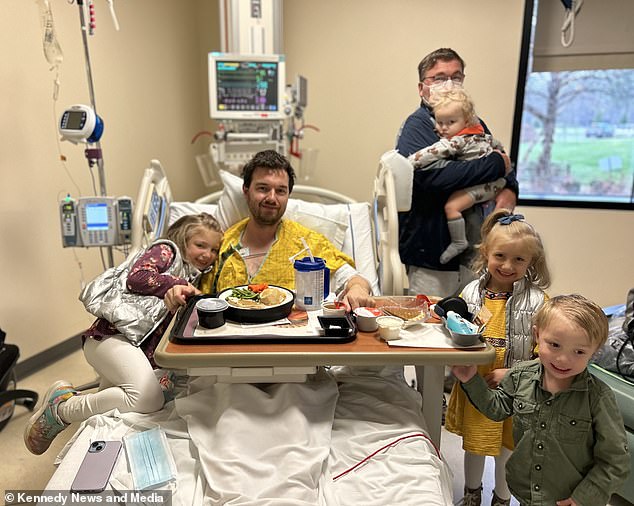

He was asked to wait two hours in the hospital before medics activated the stroke protocol and rushed him to intensive care. MRI and CT scans revealed he had severed one of four main arteries in his neck and suffered three small strokes in the lower area of his brain. He is pictured above in the hospital’s intensive care unit with (from left to right) eldest daughter Madelynne, 8, his father Gerard Hentrich, 65, and children Nikolai, 18 months, Liliya, 6, and Elijah, 3
Doctors revealed he had suffered cerebellar strokes — when the blood supply is cut off from the cerebellum, a part of the brain located at the back of the organ that helps maintain balance.
It was deprived of blood and oxygen when he severed an artery — the left internal vertebral artery — which helps supply the area. It is one of four main arteries that run through the neck to the brain.
Mr Hentrich ended up spending two days in hospital, where doctors monitored him to assess his brain damage.
Despite the accident, he has already returned to pickleball saying it is ‘one of my passions’ and that he does not want to ‘live in fear’.
Mr Hentrich said: ‘Turning my head quickly was something I’ve done a million times.
‘I went out there that day and was just playing a regular game, nothing strenuous.
‘I was just having fun and just turned my head quickly to the left to try and track a ball.
‘I felt a pop in the back of my neck. I wasn’t sure if anyone else could hear it but internally I could.’
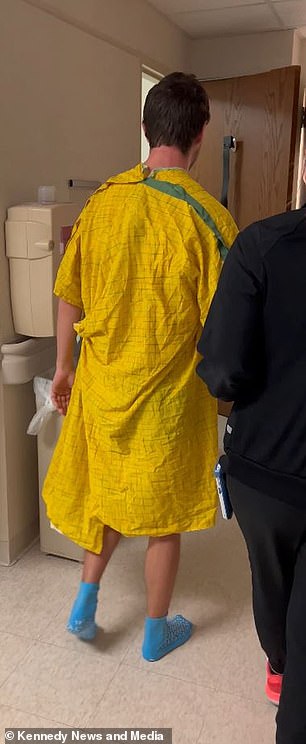

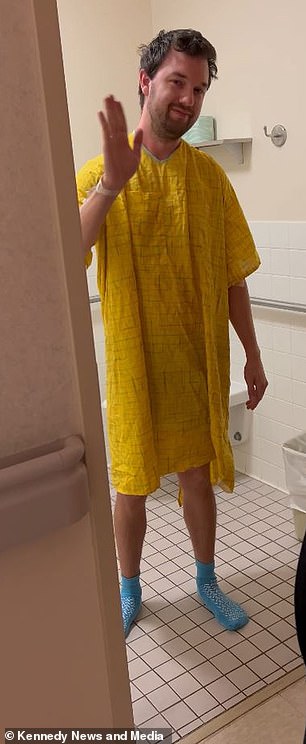

The father-of-four feared that if he had been left longer without treatment he could have lost his life, or the ability to walk. But after two days in hospital staying in bed, doctors found he was able to walk to the bathroom a few feet away. The walk to the bathroom is shown above
He added: ‘Immediately, my vision changed and I had the worst vertigo I’ve ever experienced in my life.
‘About two minutes after it happened I was having to be helped over to the bench with support because I couldn’t stand on my own at all.
‘The ground went out from underneath me and I ended up with extreme nausea and I was projectile vomiting. There was tingling on the left side of my face, hand and part of my leg.
‘My world was spinning, literally and figuratively but I trusted my instincts as all the different signs together pointed to something pretty serious.’
Mr Hentrich’s friends called an ambulance but when medics arrived they ‘didn’t seem too concerned’, because his symptoms didn’t suggest a stroke.
Two friends then drove Mr Hentrich to hospital, where he was asked to wait two hours in the emergency room with about 50 to 60 other people.
When he was eventually seen, nurses rapidly activated the stroke protocol, carted him off to intensive care and whipped him through for brain scans within minutes.
Mr Hentrich expected to be told that he had suffered a pinched nerve — when too much pressure is applied to a nerve by surrounding tissue triggering pain — in his neck that was causing the issue.
But MRI and CT scans showed he had in fact severed his left internal vertebral artery — one of the four major arteries running through the neck to supply blood to the brain.
His other right vertebral artery and both carotid arteries remained intact.
As a result, doctors said the drop in blood supply had led to three small strokes in the lower cerebellum, the area at the back and bottom of the brain responsible for balance and coordination of movement.
A cerebellar stroke is when a blocked or bleeding blood vessel triggers a drop in the blood supply to the cerebellum, in the lower part of the brain.
This differs from other strokes because it only affects the cerebellum, while leaving other areas concerned with speech, problem solving and judgement unaffeted.
Symptoms of this stroke include dizziness, vision problems, headaches and vomiting, but doctors warn these can be mistaken for other conditions.
About 10 percent of all the 795,000 strokes that occur in America every year are cerebellar strokes, estimates suggest.


Mr Hentrich is pictured above before the injury with his family. He is shown with (from left to right) partner Natalie Attan, 37, and children Madelynne, 8, Liliya, 6, Nikolai, 18 months, and Elijah, 3
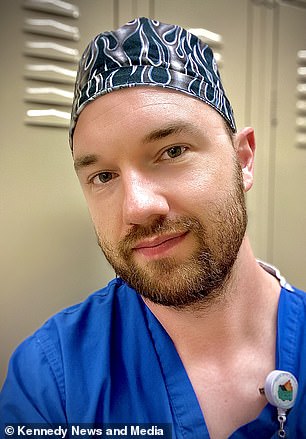



The father-of-four, who works as a nurse (left), came home in plenty of time for Christmas. On the right he is shown hugging son Nikolai, 18 months
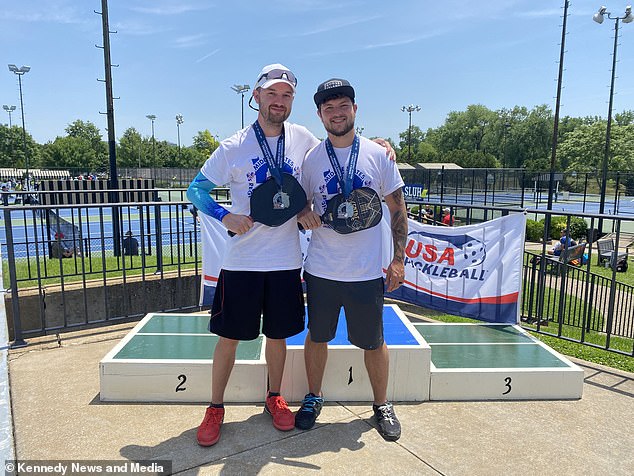

Despite the injury the keen pickleballer has already returned to the game, describing it as his ‘passion’. He felt the popping sensation after turning to track the ball ‘too quickly’
Mr Hentrich said: ‘When he said those words [that his artery had been dissected], I just looked at him and didn’t believe it at first.
‘I was in the hospital and didn’t even know if I could walk.’
He spent two days in hospital recovering from the injury, he said, and still needs to return for scans as the artery can take six weeks to heal.
On his second day, doctors asked him to walk to the bathroom a few feet away which left him feeling dizzy but he was able to get there. It was caught on video.
‘It was just such a wonderful feeling because I didn’t really know until that point in time what the outcome was truly going to be,’ he said.
‘It was a special moment to be able to get up and realize that I could still walk, balance and live my life how I did before this.’
He was able to return to light duty at his hospital four days after the injury, and has now also returned to pickleball even after the accident.
‘I love pickleball so much it’s one of my passions and I don’t want to live my life in fear of something like that happening again, I just want to be able to go out and do what I love,’ he said.
‘In life, we only have a short amount of time anyway, so we might as well live it to the fullest.’
He added: ‘Had that second nurse not taken me seriously and left me out there to wait. I have no doubt that I’d at minimum have permanent disabilities of some sort, balance and coordination-wise.
‘If I hadn’t had the treatment, I don’t know if I could have died too. There’s always that possibility, so I do feel very grateful.’
The father is now raising money on GoFundMe to help care for his four children Madelynne, eight, Liliya, six, Elijah, three, and Nikolai, 16 months.
He has also spoken out to raise awareness that these injuries can happen while playing sports.
If you enjoyed this story, why not read:
Firefighter, 31, paralyzed during freak rugby accident and told he might NEVER walk again defies odds by making remarkable recovery in just six months.
The men who have their legs BROKEN just so they can be taller! Shorter guys are paying up to $290,000 for risky op to reach 6ft and impress women.
Amateur footballer, 37, ‘almost lost his leg’ after suffering a kick below the knee during a soccer match.
